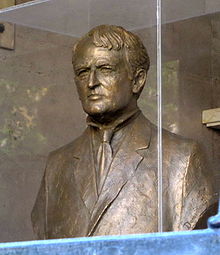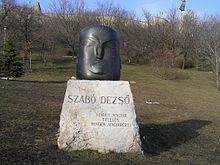- Dezső Szabó (writer)
-
Dezső Szabó (born June 10, 1879 in Cluj-Napoca, nowadays Romania, then Klausenburg/Kolozsvár/Cluj-Napoca in Austria-Hungary), died January 5, 1945 in (Budapest) was a Hungarian linguist and writer noted for his nationalist and anti-semitic views. Szabó has been considered one of the first "pioneers of Magyar populist literature".[1]
Szabó came to live in Budapest in 1918 and started publishing short essays in the literary revue Nyugat.
Though initially supporting the Hungarian Revolution of 1918 which followed the fall of the Habsburg Monarchy, Szabó soon developed into an outspoken and vehement opponent of the short-lived Hungarian Soviet Republic proclaimed by Béla Kun.
He was quick to become a well-known and highly influential and energetic writer, gaining fame for his 1919 novel "Az elsodort falu" ("The Eroded Village"), an expressionist work espousing the idea that hope for a Hungarian renaissance lay in the peasant class, as opposed to the middle class which Szabó believed was "corrupted by the mentalities of the assimilated Germans and Jews".[2] This novel enjoyed a considerable influence during the period of "White Terror" following suppression of the Communist revolution. Though he published many later books, this was considered as the peak of his literary achievements.
Szabó has been considered the first "intellectual anti-Semite among Hungarian writers",[1] and he was a regular constibutor to the journal Virradat, one of the most rabidly anti-semitic papers of the inter-war period, in which he published no less than 44 articles during three years. These articles were couched in highly apocalyptic and alarmist tones, reprimanding the Hungarian nation for its "feebleness".
Szabó explicitly never call for the physical extermination of the Hungarian Jews. He writes the next important line in "The Eroded Village" when Miklós (a key figure of his main work) says this sentence to his old jew friend: "If you should know that all my anger comes out from that I know that we depend on each other, because I love you."
However, at the same time Szabó was also vehemently anti-German, embarking in 1923 on a "Campaign to eradicate German influence in Hungary". After 1932 he was also outspokenly opposed to the Arrow Cross Party, the Hungarian Fascists—without abandoning his anti-semitic views.
This combination of views was due to his own specific brand of racism, which Szabó termed "The Apotheosis of the Hungarian Race".
His influence, considerable during the 1920s, waned in the following decade.
Szabó died in January 1945, during the siege of Budapest by the Soviet Army.
Works
- Az Elsodort Falu (1918)
- Csodálatos élet (1920)
- Jaj! (1925)
- Feltámadás Makucskán´ (1925)
- Karácsony Kolozsvárt (1931)
References
Categories:- Hungarian writers
- Antisemitism
Wikimedia Foundation. 2010.


